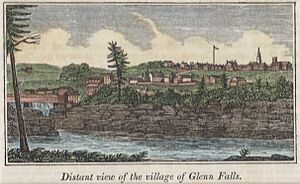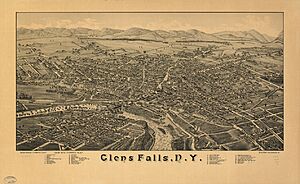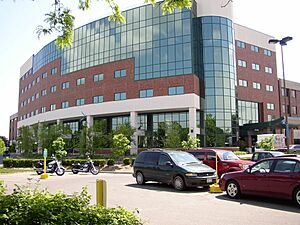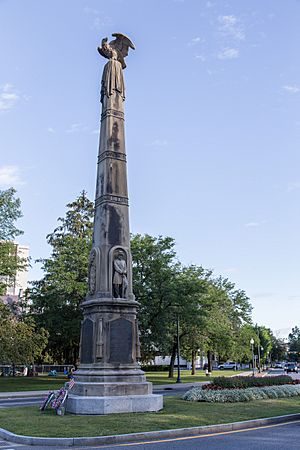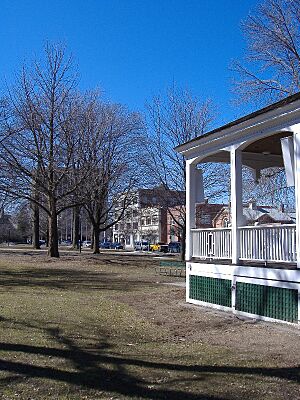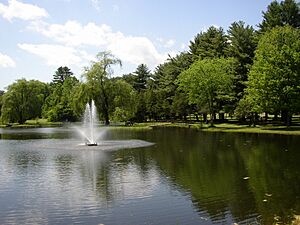Glens Falls, New York facts for kids
Quick facts for kids
Glens Falls
|
|
|---|---|
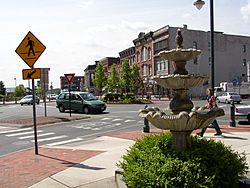
Centennial Circle, a five-leg roundabout in downtown Glens Falls, June 2009
|
|
| Nickname(s):
Hometown U.S.A., Empire City
|
|
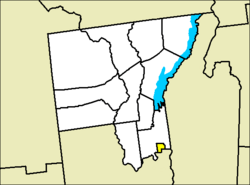
Location of Glens Falls in Warren County
|
|
| Country | United States |
| State | New York |
| County | Warren |
| Incorporated | 1839 (village) 1908 (city) |
| Government | |
| • Type | Mayor-Council |
| Area | |
| • City | 3.99 sq mi (10.33 km2) |
| • Land | 3.85 sq mi (9.97 km2) |
| • Water | 0.14 sq mi (0.36 km2) 2.54% |
| • Urban | 35.35 sq mi (91.55 km2) |
| Elevation | 344 ft (105 m) |
| Population
(2020)
|
|
| • City | 14,830 |
| • Density | 3,850.95/sq mi (1,486.92/km2) |
| • Metro | 128,774 |
| Time zone | UTC−5 (EST) |
| • Summer (DST) | UTC−4 (EDT) |
| ZIP codes |
12801, 12804
|
| Area code(s) | 518, 838 |
| FIPS code | 36-29333 |
| GNIS feature ID | 0951223 |
Glens Falls is a city in Warren County, New York, United States. It is the main city of the Glens Falls Metropolitan Area. In 2020, about 14,830 people lived here. The city gets its name from Colonel Johannes Glen and a large waterfall in the Hudson River nearby.
Glens Falls is in the southeastern part of Warren County. It is surrounded by the town of Queensbury and borders the Hudson River to the south. Glens Falls is often called "Hometown U.S.A." This nickname was given by Look magazine in 1944. It also calls itself the "Empire City."
Contents
- History of Glens Falls
- Geography and Climate
- Population and People
- Economy and Jobs
- Arts and Culture Scene
- Historic Places to Visit
- Fun Regional Events
- Sports Teams and Venues
- Parks and Recreation Areas
- Education System
- Media and News
- Transportation and Roads
- Famous People from Glens Falls
- Sister City
- See also
History of Glens Falls
The area was first called Chepontuc by the Iroquoian people who lived there. This name meant "difficult place to get around." It was also known as the "Great Carrying Place." Later, European settlers called it "The Corners."
Because it was halfway between Fort Edward and Fort William Henry, the falls area saw many battles. These happened during the French and Indian War and the Revolutionary War. The small settlement was burned down twice during the Revolutionary War. This made the Quakers (a religious group) leave until the war ended in 1783. Fires also damaged the village in 1864, 1884, and 1902.
In 1766, the area was renamed Wing's Falls. This was for Abraham Wing, a Quaker leader who helped start the permanent settlement. The name also referred to the falls on the Hudson River. In 1788, Colonel Johannes Glen of Schenectady took over the claim to the name. Local stories say this happened because of a debt, a card game, or a party. Colonel Glen changed the name to "Glen's Falls," which later became "Glens Falls."
A post office opened in 1808. Glens Falls became an official village in 1839. It grew and became a city in 1908. At this time, it became separate from the town of Queensbury.
In 2003, Glens Falls added about 49 acres (0.2 km²) of land from Queensbury. This land was empty and known as Veterans Field.
Geography and Climate
Glens Falls covers about 3.9 square miles (10.1 km²). Most of this is land, with a small part being water.
The city is located on the Hudson River. It is in the foothills of the Adirondack Mountains, right on the border of Saratoga County.
Local Weather Patterns
| Climate data for Glens Falls, New York (Floyd Bennett Memorial Airport), 1991–2020 normals, extremes 1893–present | |||||||||||||
|---|---|---|---|---|---|---|---|---|---|---|---|---|---|
| Month | Jan | Feb | Mar | Apr | May | Jun | Jul | Aug | Sep | Oct | Nov | Dec | Year |
| Record high °F (°C) | 66 (19) |
70 (21) |
86 (30) |
92 (33) |
98 (37) |
98 (37) |
101 (38) |
101 (38) |
97 (36) |
87 (31) |
78 (26) |
69 (21) |
101 (38) |
| Mean maximum °F (°C) | 51.3 (10.7) |
50.9 (10.5) |
63.9 (17.7) |
78.1 (25.6) |
87.0 (30.6) |
90.4 (32.4) |
91.1 (32.8) |
89.3 (31.8) |
85.6 (29.8) |
76.0 (24.4) |
65.7 (18.7) |
53.6 (12.0) |
92.9 (33.8) |
| Mean daily maximum °F (°C) | 29.7 (−1.3) |
33.1 (0.6) |
42.5 (5.8) |
56.6 (13.7) |
69.0 (20.6) |
77.1 (25.1) |
81.5 (27.5) |
79.6 (26.4) |
71.9 (22.2) |
59.2 (15.1) |
46.7 (8.2) |
35.3 (1.8) |
56.9 (13.8) |
| Daily mean °F (°C) | 19.7 (−6.8) |
21.9 (−5.6) |
31.7 (−0.2) |
44.6 (7.0) |
56.5 (13.6) |
65.0 (18.3) |
69.7 (20.9) |
67.8 (19.9) |
59.7 (15.4) |
48.0 (8.9) |
37.2 (2.9) |
26.6 (−3.0) |
45.7 (7.6) |
| Mean daily minimum °F (°C) | 9.7 (−12.4) |
10.6 (−11.9) |
20.9 (−6.2) |
32.7 (0.4) |
43.9 (6.6) |
52.9 (11.6) |
57.8 (14.3) |
55.9 (13.3) |
47.5 (8.6) |
36.8 (2.7) |
27.6 (−2.4) |
18.0 (−7.8) |
34.5 (1.4) |
| Mean minimum °F (°C) | −15.8 (−26.6) |
−13.1 (−25.1) |
−0.1 (−17.8) |
19.3 (−7.1) |
29.9 (−1.2) |
39.4 (4.1) |
47.5 (8.6) |
44.2 (6.8) |
32.6 (0.3) |
22.8 (−5.1) |
11.8 (−11.2) |
−3.6 (−19.8) |
−19.6 (−28.7) |
| Record low °F (°C) | −36 (−38) |
−32 (−36) |
−24 (−31) |
3 (−16) |
20 (−7) |
32 (0) |
32 (0) |
31 (−1) |
24 (−4) |
15 (−9) |
−7 (−22) |
−34 (−37) |
−36 (−38) |
| Average precipitation inches (mm) | 2.56 (65) |
1.95 (50) |
2.79 (71) |
3.10 (79) |
3.35 (85) |
3.72 (94) |
4.26 (108) |
3.48 (88) |
3.30 (84) |
3.68 (93) |
3.01 (76) |
3.01 (76) |
38.21 (971) |
| Average precipitation days (≥ 0.01 in) | 11.3 | 9.1 | 10.5 | 11.7 | 12.5 | 12.0 | 11.8 | 10.7 | 9.5 | 11.4 | 10.7 | 11.5 | 132.7 |
| Source: NOAA | |||||||||||||
Population and People
| Historical population | |||
|---|---|---|---|
| Census | Pop. | %± | |
| 1850 | 2,717 | — | |
| 1860 | 3,780 | 39.1% | |
| 1870 | 4,500 | 19.0% | |
| 1880 | 4,900 | 8.9% | |
| 1890 | 9,509 | 94.1% | |
| 1900 | 12,613 | 32.6% | |
| 1910 | 15,243 | 20.9% | |
| 1920 | 16,638 | 9.2% | |
| 1930 | 18,531 | 11.4% | |
| 1940 | 18,836 | 1.6% | |
| 1950 | 19,610 | 4.1% | |
| 1960 | 18,580 | −5.3% | |
| 1970 | 17,222 | −7.3% | |
| 1980 | 15,897 | −7.7% | |
| 1990 | 15,023 | −5.5% | |
| 2000 | 14,354 | −4.5% | |
| 2010 | 14,700 | 2.4% | |
| 2020 | 14,830 | 0.9% | |
| sources: | |||
In 2010, Glens Falls had 14,707 people living in 6,548 households. About 26% of households had children under 18. The population was mostly White (94.7%), with smaller groups of African American, Native American, and Asian people. About 2.3% of the population was Hispanic or Latino.
The average age in the city was 37.6 years. About 24.3% of the people were under 20 years old.
Economy and Jobs
Glens Falls is important for making medical devices. Companies like Navilyst Medical, which used to be part of Pfizer and Boston Scientific, are here. The city is also a major center for medical services. These services help a large area from Saratoga County up to the Adirondacks.
The Glens Falls Hospital is a big hospital with 410 beds. It is the largest employer in the area. It was started in 1897 by local doctors. The hospital has grown and been updated many times. It is now the main trauma center for the region.
Other important companies include Danfloss Flomatic Corporation, which makes industrial valves. Umicore, a company from Belgium, makes silver-based materials.
Finch Paper LLC is a big paper and forest products company. It is the largest taxpayer in Glens Falls. In 2007, the company sold its forestland to The Nature Conservancy.
Glens Falls also has a long history in finance. Arrow Financial Corporation and Glens Falls National Bank are based here. Evergreen Bank, which started in 1853, is now part of TD Banknorth.
Arts and Culture Scene
Glens Falls has many places for arts and culture.
Theaters and Performances
- The Charles R. Wood Theater has 300 seats. It hosts the Adirondack Theater Festival, which is a professional summer theater. The theater also has other shows all year. It is named after Charles Wood, who started The Great Escape & Splashwater Kingdom.
- The Glens Falls Community Theatre has been putting on plays for almost 75 years.
- The Glens Falls Symphony has been performing classical music for 30 years.
Museums and Galleries
- The Hyde Collection shows European and American art.
- The Chapman Historical Museum features exhibits about local history.
- The World Awareness Children's Museum is a children's museum that teaches about different cultures.
- The Lower Adirondack Regional Arts Council (LARAC) supports the arts. It has an annual arts festival and its own gallery.
- The Shirt Factory Arts and Healing Center is an old factory. Now it has artists' studios, shops, and galleries.
Special Memorials
- The Glens Falls September 11 Memorial honors those who died on that day and the first responders. It has granite towers that look like the World Trade Center and walls like the Pentagon. It also includes a piece of steel from the World Trade Center.
Historic Places to Visit
Glens Falls has many historic places. Two areas are listed on the National Register of Historic Places.
- Crandall Public Library: Founded in 1893, this library moved to its current building in 1931.
- Civil War Monument: This stone monument was built in 1872. It honors 644 men from the area who fought in the American Civil War. The names of 95 men who died are carved on it.
- Zopher Delong House: This old house is now the Chapman Historical Museum.
- Glens Falls Feeder Canal: This canal was built around 1820 to bring water to the Champlain Canal. Canals were very important for trade in New York in the 1800s.
- First Presbyterian Church: This church was started in 1803. Its current building was built in 1929.
- Fort Amherst Road: This was the site of Fort Amherst, a blockhouse built by the British. It was a halfway point between Fort Edward and Fort William Henry. This fort helped protect the British colonies from the French during the French and Indian War.
- Louis Fiske Hyde House: This house is now The Hyde Collection, an art museum.
- The Oldest Building in Glens Falls: This stone and brick building was built around 1815.
- Quaker Meeting House: This building was constructed in 1875.
- St. Mary-St. Alphonsus Regional Catholic School: This school started as St. Mary's Academy in 1883.
- Historical Marker for Wilhelmina Weber Furlong: A marker near City Hall honors this American Modernist painter.
Fun Regional Events
- Adirondack Balloon Festival: Started in 1973, this is a four-day hot air balloon festival. Events happen at the Floyd Bennett Memorial Airport and Crandall Park.
- Lower Adirondack Regional Arts Council June Arts Festival: This festival has been held every year since 1972.
- New York State Boys' Public High School Basketball Tournament: This tournament started in 1981.
- The Third Thursday Glens Falls Art Walk: A regular event where people can explore art in the city.
Sports Teams and Venues
Glens Falls has a strong history with minor league hockey.
- The Adirondack Red Wings played here from 1979 to 1999. They won the Calder Cup four times.
- Other hockey teams like the Adirondack IceHawks, "Frostbite," Adirondack Phantoms, and Adirondack Flames also played in Glens Falls.
- Today, the Adirondack Thunder (an ECHL team) plays in Glens Falls.
Local Sports Teams
- Glens Falls Greenjackets: This semi-pro football team started in 1928. It is one of the oldest active semi-pro football teams in the country. They play at East Field.
- Glens Falls Dragons: This baseball team plays in a summer league for college players. They also play at East Field.
Parks and Recreation Areas
- City Park: Located in the city's downtown area, it includes the public library.
- Crandall Park: This park has a pond, war monuments, and recreation areas. It is next to the Coles' Woods International Ski Trail system.
- Cool Insuring Arena: Opened in 1979 as the Glens Falls Civic Center, this arena hosts sports, concerts, and other events. The Adirondack Thunder hockey team plays here.
- East Field: This field is home to the Glens Falls Dragons baseball team and the Greenjackets football team. It has also hosted other baseball teams in the past.
Education System
The city is part of two school districts.
- The Glens Falls City School District covers most of the city and parts of Queensbury. It includes Glens Falls High School, a middle school, and three elementary schools (Big Cross School, Jackson Heights School, and Kensington Road Elementary School).
- The Glens Falls Common School District runs an independent public elementary school called Abraham Wing Elementary School. It is named after one of the founders of Glens Falls.
- Saint Mary's–Saint Alphonsus Regional Catholic School is a private Catholic school for children from pre-kindergarten to eighth grade.
Media and News
Print Media
- The Post-Star is a daily newspaper published in Glens Falls. It covers news from Glens Falls, Saratoga, and nearby counties.
- The Chronicle is a free weekly newspaper that started in 1980.
Radio Stations
- WMML/1230 (AM)
- WWSC/1450 (AM)
- WLJH/90.7 (FM)
- WGFR/92.7 (FM)
- WBLN-LP/104.9 (FM)
Television
Glens Falls is part of the Albany/Schenectady/Troy TV market. One local low-power station, WNCE-CD (TV-31), broadcasts from Glens Falls.
Transportation and Roads
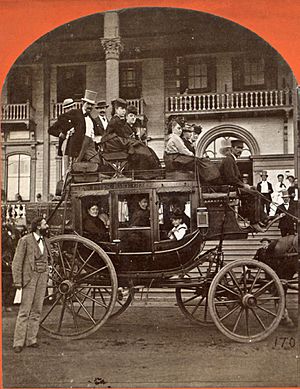
Air Travel
- Floyd Bennett Memorial Airport is a public airport located northeast of the city.
Bus Services
- The Capital District Transportation Authority provides bus service for Glens Falls and nearby areas.
Major Roads
- U.S. Route 9 (also known as Glen Street in Glens Falls)
- New York Route 32
- New York Route 9L
Glens Falls has a street layout that spreads out from the center, a design from its early days.
Famous People from Glens Falls
Many notable people have connections to Glens Falls:
- Joseph Bruno: Former leader of the New York State Senate; born in Glens Falls.
- Bradshaw Crandell: Illustrator and Hollywood portrait artist; born in Glens Falls.
- John Alden Dix: 41st governor of New York; born in Glens Falls.
- "Hacksaw" Jim Duggan: Famous professional wrestler; from Glens Falls.
- Lisa Eichhorn: Actress; born in Glens Falls.
- Jimmer Fredette: Well-known college basketball player; from Glens Falls.
- Charles Evans Hughes: Former Governor of New York and Chief Justice of the U.S. Supreme Court; born in Glens Falls.
- Dave LaPoint: Retired Major League Baseball pitcher and World Series champion.
- Peter Mahovlich: Retired All-Star hockey player and Hall of Famer; lives in Glens Falls.
- Barry Melrose: Former NHL hockey coach and TV commentator.
- Lorrie Moore: Award-winning author.
- Johnny Podres: Famous pitcher for the Brooklyn and Los Angeles Dodgers.
- Edward C. Prescott: Won the Nobel Prize in Economics in 2004; graduated from Glens Falls High School.
- Kate White: Former editor-in-chief of Cosmopolitan Magazine; considers Glens Falls her hometown.
Sister City
 – Saga, Japan
– Saga, Japan
See also
 In Spanish: Glens Falls para niños
In Spanish: Glens Falls para niños




